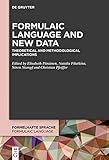Formulaic Language and New Data : Theoretical and Methodological Implications.
Yazar:Piirainen, Elisabeth
Katkıda bulunan(lar):Filatkina, Natalia | Stumpf, S�oren | Pfeiffer, Christian
Materyal türü: KonuSeri kaydı: Yayıncı: Berlin/Boston : Walter de Gruyter GmbH, 2020Telif hakkı tarihi: �2020Tanım: 1 online resource (286 pages)İçerik türü:text Ortam türü:computer Taşıyıcı türü: online resourceISBN: 9783110669824Tür/Form:Electronic books.Ek fiziksel biçimler:Print version:: Formulaic Language and New DataDDC sınıflandırma: 410 Çevrimiçi kaynaklar: Click to View
KonuSeri kaydı: Yayıncı: Berlin/Boston : Walter de Gruyter GmbH, 2020Telif hakkı tarihi: �2020Tanım: 1 online resource (286 pages)İçerik türü:text Ortam türü:computer Taşıyıcı türü: online resourceISBN: 9783110669824Tür/Form:Electronic books.Ek fiziksel biçimler:Print version:: Formulaic Language and New DataDDC sınıflandırma: 410 Çevrimiçi kaynaklar: Click to View Intro -- Acknowledgments -- Content -- Introduction: Formulaic Language and New Data -- Part I: Lesser-Used and Areally Limited Languages -- Lesser-Used Languages and their Contribution to the Study of Formulaic and Figurative Language -- Areal Variation and Change in the Phraseology of Contemporary German -- An Analysis of Basque Collocations Formed by Onomatopoeia and Verbs in a Translational Corpus of Literary Texts -- Part II: Languages Spoken outside Europe -- (How) is Formulaic Language Universal? Insights from Korean, German and English -- Marḥaban: Reconsidering the Criteria of an Arabic Phraseme -- Formulaic Expressions of Politeness in Jordanian Arabic Social Interactions -- Part III: Linguistic Varieties Used in Spoken Domains and/or Regarded as 'Conceptually Oral' -- New Pragmatic Idioms in Polish: An Integrated Approach in Pragmateme Research -- Compositionality: Evidence from Code- Switching -- Part IV: Earlier/Historical Stages of Language Development -- Insights into a Changing Communal Constructicon -- Religious Formulae in Historical Lower- Class Patient Letters.
The book series offers a platform for usage and corpus based, theoretical and methodical, synchronic and diachronic studies aiming at all forms of formulaicity - linguistic, cognitive, conceptual - at all levels of language system and in language use as well as in not purely linguistic areas.
Description based on publisher supplied metadata and other sources.
Electronic reproduction. Ann Arbor, Michigan : ProQuest Ebook Central, 2022. Available via World Wide Web. Access may be limited to ProQuest Ebook Central affiliated libraries.







There are no comments on this title.